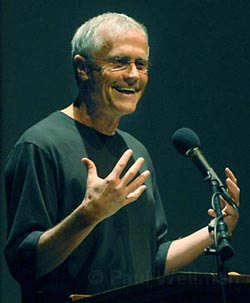Environmentalist Paul Hawken
at the Lobero Theatre
Playing the Infinite Game
In the past decade, global warming has shifted from a little-understood concept to the planet’s most pressing concern-environmentally, politically, and socially. While every nation on earth seems to agree we have a major challenge on our hands, it’s unclear who the leaders are in the movement to tackle the issue and work for a solution. Sounds alarming, but that’s exactly what gives Paul Hawken hope.

Hope, of course, is a tenuous term, one Hawken himself wants to reframe. He speaks of the 21st-century need for “radical hope”-the kind you have when you don’t know where you’re going, only “who you’re going to be.” What gives Hawken radical hope is the grassroots nature of the movement to address the world’s ills-not just global warming, but the environmental and social justice concerns he sees as inextricably linked. “We’re seeing a massive change,” he insisted, “from a world created by privilege to a world created by community.”
Hawken’s research group, Natural Capital Institute, has launched a Web site, wiserearth.org, which catalogs and connects hundreds of thousands of organizations committed to social, political, and environmental solutions. “This movement is not trying to amalgamate power for itself,” he told his Lobero audience. “It can’t be divided; it already is. Ironically, it’s seen as powerless.”
In his eyes, it is anything but. Despite what he so vividly described as “a 500-year history of destruction and sclerotic bureaucracies,” he sees evidence everywhere for a growing human network dedicated to solutions. The title of his new book, Blessed Unrest, captures his reverential tone. “I have developed,” he told his audience earnestly, “a profound appreciation for us.”
But Hawken is by no means naive. “Things are going to get worse,” he said with conviction. “If you’re looking at the data and you’re optimistic, you’re not looking at the data.” Nevertheless, he insisted, “We can control one thing, which is our intention.” In essence, his is a non-Western approach to problem-solving. The game he proposes we play is not a finite game with winners and losers, but an infinite game in which every player does everything possible to keep the game going. Beaming like Buddha himself, he asserted, “This is the most exciting time the world has ever created for itself.”



